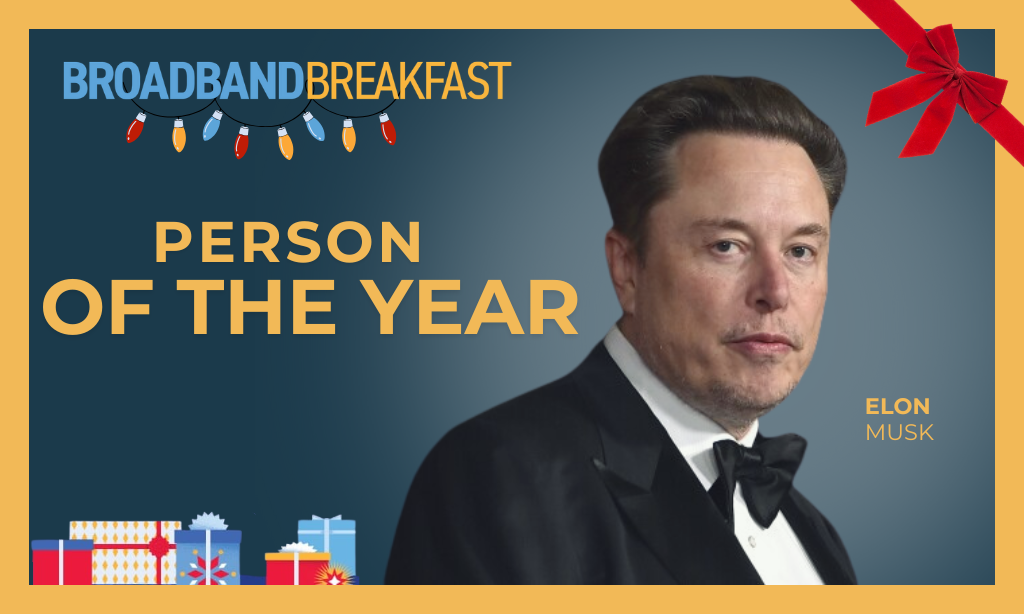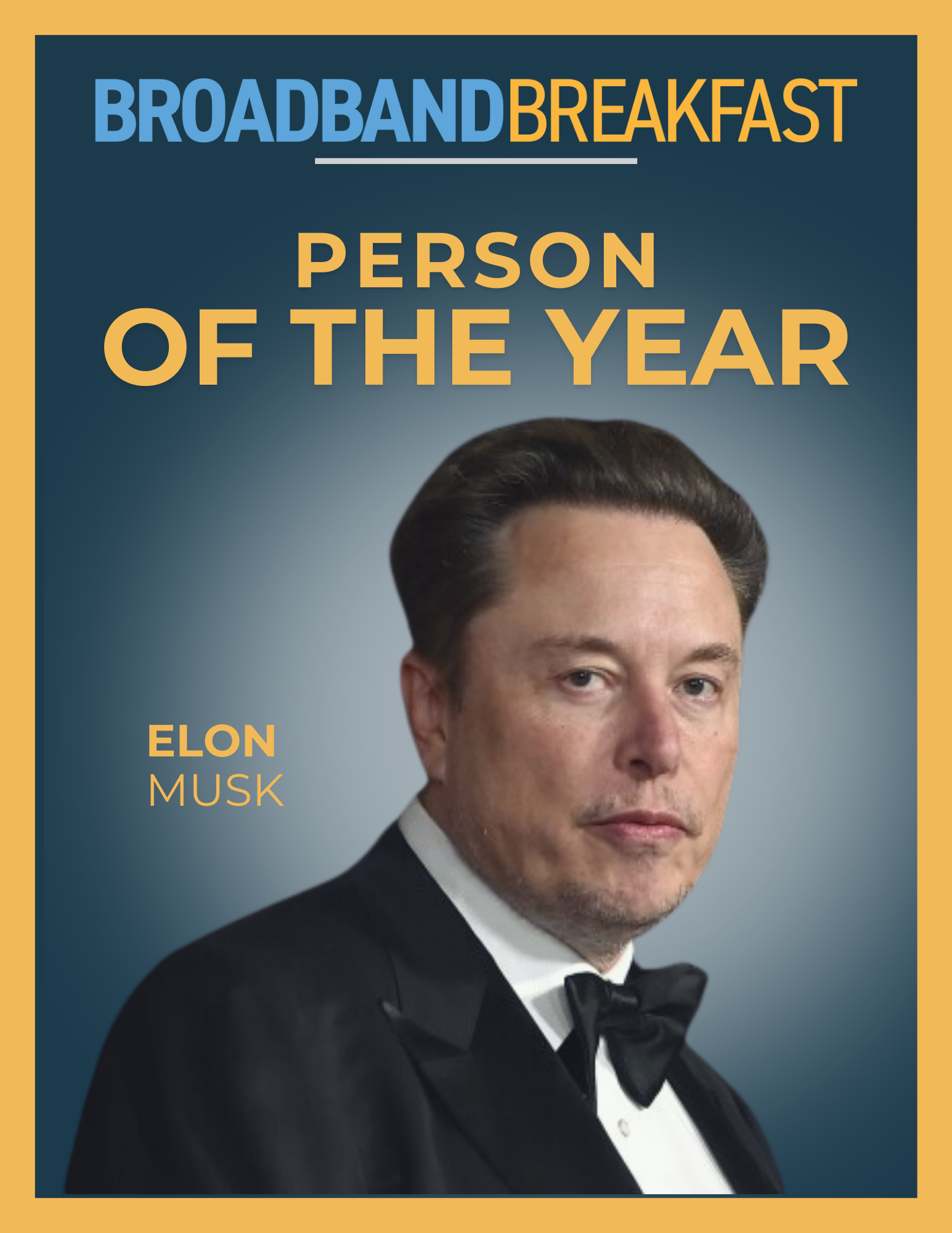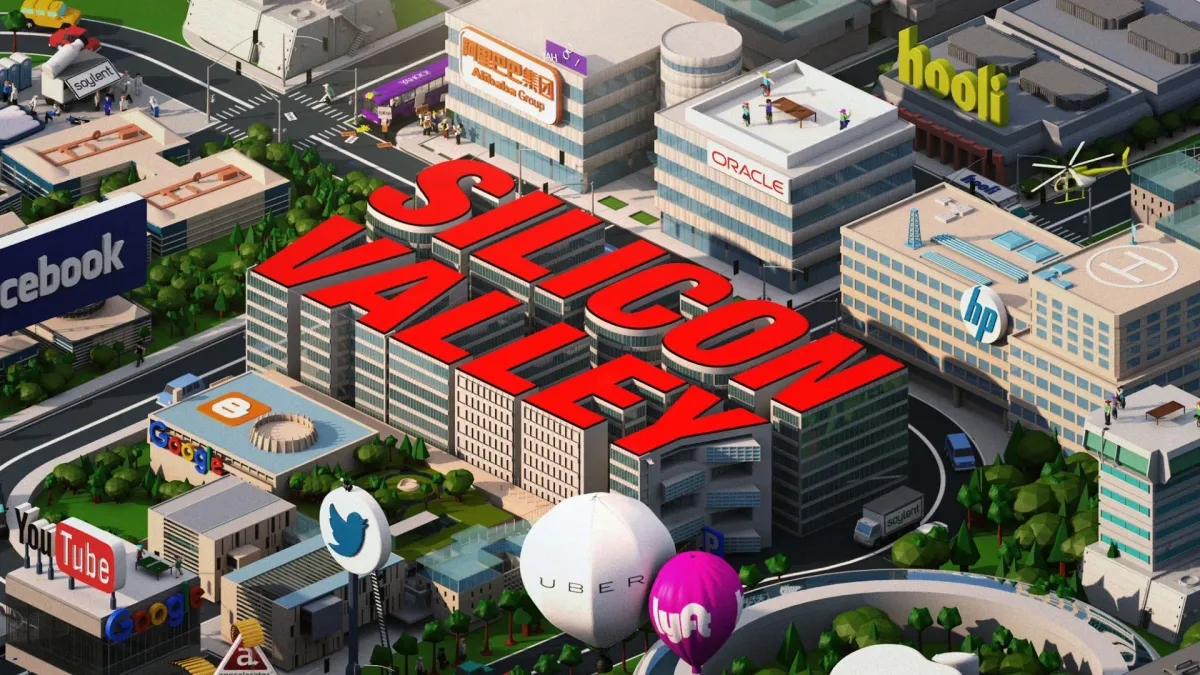Broadband Breakfast Person of the Year: Elon Musk
In our view, without Musk’s support, Trump would not have won the presidency.
Broadband Breakfast

Today, Broadband Breakfast kicks off its annual “12 Days of Broadband,” a tradition since 2022. And, for the first time, Broadband Breakfast also names its first Person of the Year: Elon Musk.
What is the 12 Days of Broadband? It is a series of 12 articles, each covering one of the most significant news stories of the year for high-speed internet, themed around the “12 Days of Broadband.” Look for a new story each Monday-Friday until January 2, 2025, each (except for this Person of the Year article) available exclusively to Broadband Breakfast Club Members.
The 12 Days of Broadband (click to open)
- On the First Day of Broadband, my true love sent to me:
An extra-planetary-life-promoting tech billionaire set on electing a president. - On the Second Day of Broadband, my true love sent to me: 23 million served by the Affordable Connectivity Program.
- On the Third Day of Broadband, my true love sent to me:
3rd year without the Federal Communications Commission having spectrum auction authority. - On the Fourth Day of Broadband, my true love sent to me:
$42.5 billion in Broadband Equity, Access and Deployment funds already allocated. - On the Fifth Day of Broadband, my true love sent to me:
5,500 active satellites currently in Low-Earth Orbit. - On the Sixth Day of Broadband, my true love sent to me:
More than 6 years of service at the FCC by Commissioner and Chairman-designate Brendan Carr. - On the Seventh Day of Broadband, my true love sent to me:
More than 70 billion kilowatt-hours of electricity annually consumed by data centers in the U.S. - On the Eighth Day of Broadband, my true love sent to me:
$8.1 billion dollars in annual Universal Service Funds. - On the Ninth Day of Broadband, my true love sent to me:
$90 billion in global telecom Merger & Acquisition deals value in 2024. - On the Tenth Day of Broadband, my true love sent to me:
100 broadband-related rulemakings at the FCC relying on Chevron Deference. - On the Eleventh Day of Broadband, my true love sent to me:
Nearly 11 years to complete the Rural Digital Opportunity Fund, complete with defaulted locations. - On the Twelfth Day of Broadband, my true love sent to me:
More than a dozen policy-makers and pro-tech thinkers echoing the Andreessen-Horowitz “Little Tech” agenda.
Today, we’re also naming a Person of the Year for 2024. Why? Well, last week Time Magazine dutifully named Donald Trump as the 2024 Person of the Year, as it had done in 2016. Noteworthy: Joe Biden and Kamala Harris were named the Persons of the Year in 2020. The magazine practically always names the winning presidential candidate each election year.

Freed from the burden of naming a president, we think it is more appropriate to designate Musk as the “Person of the Year.” In our view, without Musk’s support, Trump would not have won the presidency. And we’re naming him Person of the Year not just for his commander-in-chief-making: Musk dominates an incredibly innovative constellation of companies in the media, communications and transportation – terrestrial and celestial.
And that isn’t the end of it: He’s a one-man (well, actually a two-man) force for government change, as the co-head of the so-called “Department of Government Efficiency” (DOGE), an advisory body that is likely to be much more than advisory. He and Vivek Ramaswamy, an unsuccessful GOP presidential candidate, also a lion (or at least a cub) in the world of Silicon Valley, have set Washington on fire, or on edge.
In the course of barely more than the month since Election Day, DOGE has gone from a cryptocurrency joke to a potentially far-ranging force for a transformative Trump Administration: Powered by Elon Musk.
Elon Musk and innovation
There are at least four vectors from which to view Musk’s business operations and acumen: Transforming the auto industry and the clean energy economy through Tesla, his insanely ambitious goal for humans to become an interplanetary species (hence SpaceX and all that it enables), his stupid-until-it-wasn’t-stupid acquisition of Twitter (now X), and – let’s just call it “other stuff” – Artificial Intelligence through xAI, chips in skulls through Neuralink, or groundbreaking efforts to fundamentally reshape transportation infrastructure like the Boring Company.
Almost all of these ventures impact Broadband Breakfast’s orbit, which focuses on better broadband infrastructure and the role that it plays in people’s lives.
And hence there are so many ways in which to parse Musk’s choice of candidates to run for president. How will Trump’s anticipated tariffs on China impact Tesla sales? How will the GOP political platform’s promise to “drill, baby, drill” impact the (now more muted) climate change goals that were once front and center for Musk and Tesla?
But there’s much, much more. SpaceX now dominates the U.S. and global space and rocket launch industry. SpaceX may formally need NASA authorization and contracts to grow. But now it’s equally clear how NASA relies on SpaceX.
And, by launching Starlink low-earth orbit (LEO) satellites through the payload capacity of SpaceX, Musk has over the past five years built a completely different internet service provider in the form of Starlink. Its U.S. customer base now exceeds all but the four largest ISPs: Comcast, Charter, AT&T and Verizon.
Musk has had well-documented fights with the Biden Administration’s Federal Communications Commission over whether its Rural Digital Opportunity Fund program (begun under Trump 45 Administration FCC Chairman Ajit Pai) should go to Starlink.
On the far more substantial Broadband Equity, Access and Deployment program of the Commerce Department, it’s increasingly clear that at least some – and maybe a lot – of federal broadband financial support will go to Starlink when the Trump 47 Administration begins on January 20, 2025.
And what about that X (Twitter)? Yes, Musk has admitted that he overpaid for the global free speech platform that he bought in 2022, and soon instituted layoffs of nearly 80 percent of its staff. But what a global town square it was – and still is. When President Biden announced his decision to step down from the 2024 presidential contest on July 21, he did so on Twitter. Note to liberal BlueSky-ers: Twitter is still the global town square.
But now, it’s not an ostensibly even-handed platform that would frequently get skewered in Congress for its allegedly liberal bias. Instead, it is an avowedly pro-Trump platform that has put any pretense of political neutrality behind.
It has become a powerful voice for Trumpism. And it makes the Trump 45 Administration’s efforts to repeal Section 230 on the grounds that Twitter, et. al., were biased seem, well, quaint.
Clearly, there is more. Of the two tech-related issues that emerged as salient points at the Republican National Convention – AI and crypto – Musk has had a hand in both, and may soon have still bigger hands. Musk is the leading member of the billionaire Silicon Valley class (although he personally has departed to Texas) that may have been the decisive force swinging the election in Trump’s favor.
Elon Musk and political power
We weren’t convinced that Musk needed Trump to win for the sake of his businesses. He probably deduced that a Harris Administration (unlike a Trump Administration?) would treat him fairly even if he opposed her. Sure, he’s been vocally anti-woke. And throughout this year, he would occasionally criticize the Biden Administration over a range of policies, including the slow roll-out of BEAD.
But the endorsement didn’t come until the assassination attempt.
"I fully endorse President Trump and hope for his rapid recovery," Musk posted on X.
That might have been it. That’s what most billionaires do. Even the $200 million that Musk spent on Trump’s election, while more than pocket change to almost everyone else, couldn't dent his reported $455 billion in net worth.
It was, instead, Musk’s utter engagement. He gave a permission structure to many less-engaged voters: Can the world’s richest man really be wrong in going all-in for Donald Trump?
It was his daily barnstorming of Pennsylvania. It was the ground game of his America super PAC. It was his $1 million/day award prizes, per selected person, for individual voters that signed a pledge of support (in addition to an award of $47 per referral of registered voters, $100 per person in the case of Pennsylvania registered voters).
Opening up the X app in October became an exercise in witnessing Musk For Trump. Far more visibly than any other surrogate, for either side, in this presidential contest.
But it didn’t end on Election Day, which ended with Musk at Mar-a-Lago. Trump devoted the greatest portion of his acceptance speech to praising Elon Musk. That’s when it became clear that Musk - practically taking up residence at Trump’s Palm Beach, Florida, resort – meant to be in this for the long haul.
Elon Musk and the Trump Administration
How long will the bromance last? That’s the question on many people’s mind. But it’s the wrong question.
Goodness knows that Donald Trump can be unpredictable. But what is only now coming into view is the role that Musk – and the radical disruption that his businesses represent – could well become the animating “ideology” of the Trump 47 Administration.
The creation of the DOGE may well be much more than its critics (or even its defenders) are anticipating. For a long, long time, Silicon Valley and the culture of innovation that it represents have always regarded Washington with distrust. Its goal has always seemed to be: Stay as far away from Washington as physically possible.
 Broadband BreakfastDrew Clark
Broadband BreakfastDrew Clark
Now, that’s changed. And, in a weird sort of way, Trump 47 could become the “Silicon Valley” administration. Although Musk has deep ties with the communities and power centers in the Valley (for example, he was one of the group that launched OpenAI in its non-profit days), he – like Trump – is a disruptive outsider to their culture.
This is what Musk, finally, brings to Trump: A disrupt-or-die ideology.
Silicon Valley once was the place to which Democrats and Republicans paid lip service, and claimed they wanted to emulate. But did the Democratic and Republican politicians do anything of their own to disrupt Washington?
The venture capitalists who have flocked to Trump’s side, locked arm-and-arm with Musk, have finally found a way to be both in favor of the disruption that Silicon Valley allegedly represents, and also potentially against the particular power centers (think Google, Meta, Amazon, Apple and now Microsoft) of the tech industry.
DOGE is the first battering ram. Can $2 trillion really be cut from the federal budget, as Musk and Ramaswamy say they want to? We’ll see.
But we wouldn’t put such cuts past Musk, Broadband Breakfast's Person of the Year for 2024.
Investors and pro-Trump VCs are caught up right now with euphoric expectations of stock market returns in the Trump 47 Administration. More importantly, though, the incoming presidential administration of Donald Trump could be very much unlike the Trump 45 Administration.
At least as long as Elon’s on his side.









Member discussion